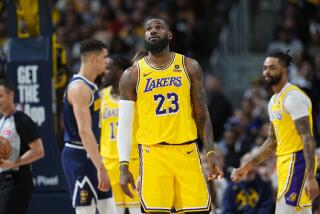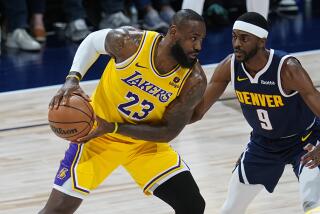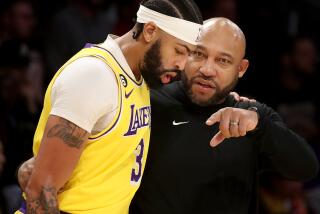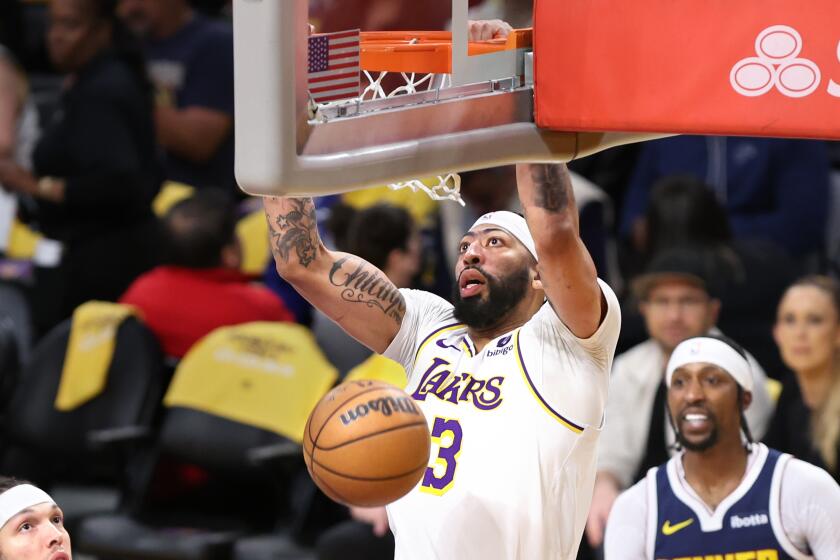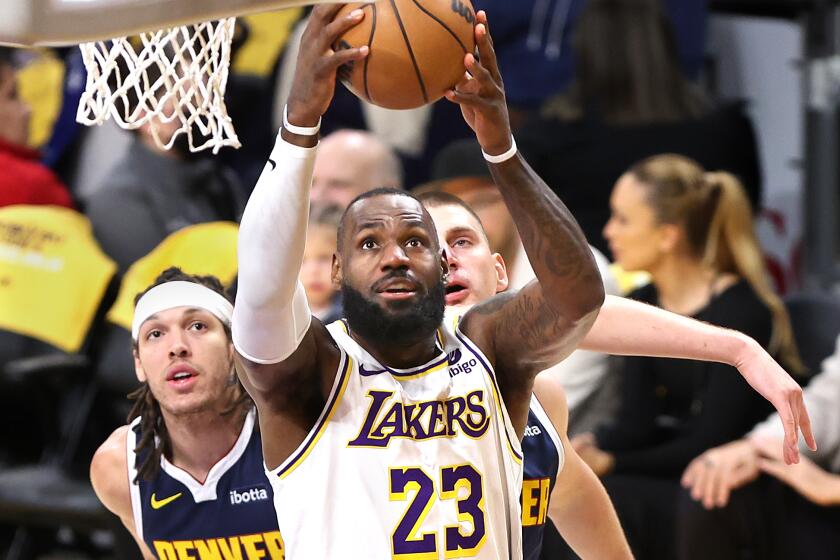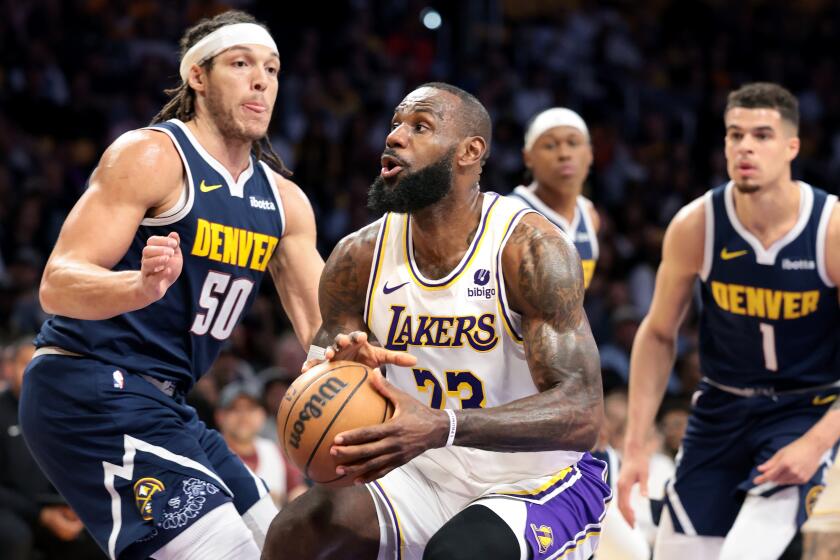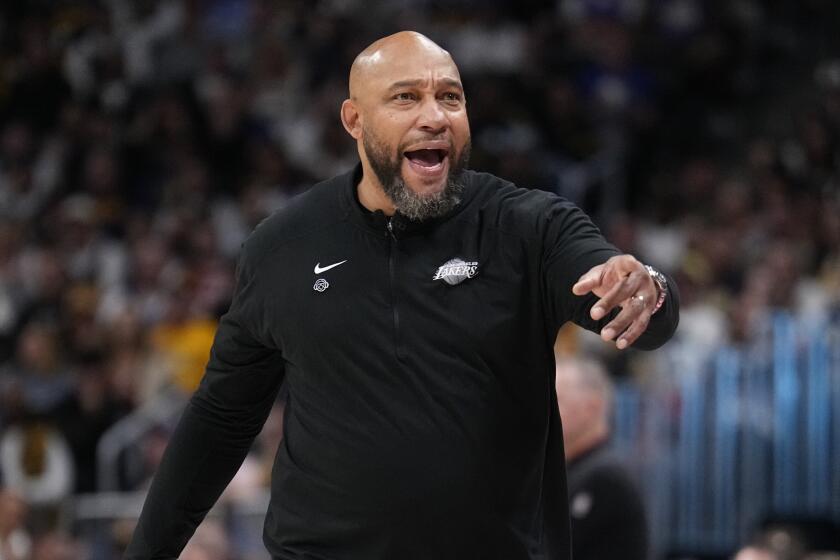POP CULTURE
The great Laker-Spur rivalry is over. The Lakers won three titles to the Spurs’ two. The Lakers said goodbye in last spring’s final duel of the Shaq-Kobe era, when Derek Fisher broke the Spurs’ hearts in the second round of the playoffs.
On the other hand, the Shaq-Kobe era is over but the Spurs aren’t.
Nor are they running down. With four starters 29 or younger, their top three players signed through 2010 and no ego conflicts, the Spurs may only have just begun.
They’re special but not because they’re so talented. The Spurs are special because they’re the one good team that hasn’t blown itself up since the mid-’90s, when the league turned young and entitled.
Not that Gregg Popovich, coach, president and proprietor of the best little dynasty in Texas, wonders how they did it.
“David Robinson and Tim Duncan,” he said last week after the Spurs had put away the Phoenix Suns, breaking up the interview room. “What franchise has been more fortunate than that?
”... What we have done really well is, we haven’t screwed it up. But that’s it.”
Actually, that’s not it at all. Even with their twin lightning bolts of fortune, this wasn’t inevitable, or even probable.
Duncan almost left in 2000, with Robinson turning 35 and the three other starters, Mario Elie, Avery Johnson, and Sean Elliott, 37, 35 and 32, respectively.
Even with Duncan secured, they could have fractured in the springs of 2001 and ‘02, when the Lakers sent them home in four and five games, respectively.
Even without fracturing, they could have stayed bridesmaids if they hadn’t found a future star from France at No. 28, the last pick of the first round in 2001, and another from Argentina at No. 57, the second-to-last pick of the second round in 1999.
It all revolved around Popovich, even if he denies it or scoffs at it. Once forbidding -- “militaristic” was the word that always came up -- Popovich is the exception to the rule. The more he wins, the more comfortable he gets.
“One reason players like him is, he never takes credit for anything,” says Steve Kerr, the TNT announcer who played for him. “You should have seen him accept his coach-of-the-year trophy in 2003. He was trying to just grab it and run back, anything he could do to avoid the situation.”
Popovich is, indeed, embarrassed by praise but there’s more working here than humility.
“He’s an interesting guy,” says Kerr. “He’s interested in other things, like world politics. He has a military background. We really don’t know what he did.... I think he was a spy.”
Popovich did graduate from the Air Force Academy, majored in Soviet studies, speaks Russian, worked in USAF intelligence and is reluctant to talk about himself. Of course, Kerr says the spy thing is a joke.
In any case, meet the smartest man in the NBA nobody knows anything about.
Sweet Home, San Antonio
If Popovich was a spy, he must have been like the tennis-playing secret agent portrayed by Robert Culp, who starred opposite Bill Cosby in the ‘60s TV show “I Spy.”
As an officer, Popovich played a lot of basketball. He toured Eastern Europe and the Soviet Union with the U.S. Armed Forces team. In 1972, he was the captain, even rating an invitation to the Olympic tryouts.
As a basketball coach, however, he was a very late bloomer.
Popovich spent six years as an assistant coach at the academy and eight as coach at Division III Pomona-Pitzer. He made $17,000 and one year lived in a dorm with his wife and two children, serving as house parents. They often ate in the school cafeteria. “We thought we lived pretty high,” Popovich said later.
He was 38 when he met Larry Brown, then at Kansas. Brown offered him a volunteer assistant’s job and the Popoviches moved to Lawrence. A year later, in 1988, Brown went to San Antonio and the Popoviches moved again.
San Antonio was picturesque but, as far as the NBA went, unlikely. The Spurs had been hanging on since entering the league from the folding ABA in 1976. They had good teams with players such as George Gervin and James Silas. Their fans were enthusiastic. It was also one of the lowest-resource markets. The only way the Spurs could get a new building was to play in the cavernous Alamodome, which was designed to attract the NFL, which it never did.
In 1993, a syndicate of 22 local owners bought the team just to keep it in town. Syndicate head Gen. Robert McDermott, a retired military man and insurance executive, knew Popovich, by then an assistant on Don Nelson’s Golden State staff, and in 1994 hired him as the new general manager.
McDermott wanted a “values-oriented approach.” This would require changes, since they had Dennis Rodman, who had helped them finish first in the West before rebelling in the playoffs, horrifying the fans in what was essentially a bedroom community for the nearby military bases. Rodman remained Rodman and Popovich let him go after one season together.
After one more season, with Robinson hurt and the team off to a 3-15 start, Popovich let Coach Bob Hill go too, after 62-20 and 59-23 seasons.
Popovich had decided they had to change from a soft, offense-minded team that won a lot during the season but went nowhere in the playoffs, to a tough defensive team.
However, axing Hill didn’t seem fair and finishing 20-62, with Robinson playing only six games, didn’t impress anyone. Fans were unhappy and the local press wasn’t complimentary but the Spurs became a defensive team.
“We were in a position that year, guys were dropping like flies,” says Will Perdue, a center for that 1996-97 team. “And the one thing he tried to instill in us, he started with a defensive philosophy. You know, pounding that into guys’ heads, even though we were winning one out of every five, six games.”
That spring, with only the third-best chance of getting the top pick in the 1997 draft, their ship came in -- again. Duncan became a Spur and everyone felt a lot better.
OK, Let’s See You Keep Him
In Duncan’s second season, the Spurs started 6-8, amid speculation Popovich would be told to hire a real coach and go back upstairs. The Spurs went 31-5 the rest of the lockout-delayed season, 15-2 in the playoffs, including a sweep of the Lakers, and won what Phil Jackson would call their “asterisk” title.
Duncan was a season from free agency and it became a nervous, disappointing season. He sat out the first round of the 2000 playoffs because of a knee injury as the Spurs were ousted by Phoenix.
Shortly thereafter, Duncan accompanied his friend, Grant Hill, and their agent, Lon Babby, to Orlando. When Duncan extended his trip, gloom fell over San Antonio.
When Duncan returned, he met with Popovich but it didn’t go well.
“It was not a good meeting,” says General Manager R.C. Buford. “... You know, there was never going to be another cloudy day in Orlando. It was a real pretty picture they had painted there. ...
“They had a lot of No. 1 picks coming, they had the coach of the year [Doc Rivers]. We didn’t have a lot to sell. What we had was a team that was pretty good at the time.... But going forward, David wasn’t going to play for a long time.”
Robinson, vacationing in Hawaii, got a phone call, flew back that night and had Duncan over for dinner the next night.
“On the way home from David’s house, Tim stopped at Pop’s house,” says Buford. “And they sat on the porch and talked until about 3 o’clock in the morning.”
So Robinson made the difference?
“Absolutely,” says Buford.
The crisis was over for the moment -- but Duncan’s new contract had an opt-out in two more seasons, in the summer of 2003 when Robinson would retire. Orlando was saving cap space for that summer, and Rivers was close to Duncan too.
The Spurs then turned their roster around in two seasons, winning their second title in the spring of 2003. Duncan didn’t even think of leaving, instead signing an extension.
This was the unlikeliest part of all. Without fanfare, with Buford’s role changing from assistant coach to GM, the Spurs had begun looking for international players flying below the radar, since they were always drafting late.
In 2001, they came up with Tony Parker, the 28th pick; in 2003, they got Manu Ginobili, whom they had drafted at No. 57 four years earlier.
“Nobody in the organization knew he was going to be as good as he is now,” Popovich says of Ginobili. “OK, we’ll take credit because we drafted him. We take no credit for how good he is now.
“You know, things like that, you can’t control. Getting Tony Parker [at No. 28] worked out great but that’s good fortune as much as it is adding two plus two and figuring it out.”
R-i-g-h-t. Everybody takes fliers. No one ever hit it as big with theirs as the Spurs.
Parker arrived at 19, stunned everyone by starting at point guard right away and, at 20, was the second-leading scorer on an NBA champion.
Ginobili had an even bigger upside, becoming an All-Star this season when Sun Coach Mike D’Antoni called him “one of the best players on the planet.” Then there’s this season’s find, point guard Beno Udrih of Slovenia, and soon, perhaps, Luis Scola, a 6-foot-9 Argentine power forward now playing in Spain.
With Duncan, who’s from the U.S. Virgin Islands, they’re an unlikely bunch of Texans. It may be no coincidence that they’re so unselfish and that their best players grew up outside the frenzied, pandering U.S. youth system.
“Tim allows Pop to yell at him and coach him,” says Kerr. “That kind of sets the tone. David was the same way. With that said, Pop makes it work. He strikes a great balance between discipline and humor. He’s a really fun guy to play for.”
The Spurs also strike a balance between cooperation and candor. Running one’s mouth in the media is vigorously discouraged. They’re sentimental only to a point. When the sainted Robinson’s contract ran out in 2002, he was offered a one-year deal ... only after the organization had made a run at another free agent, Chris Webber.
Still, this is a different organization. When a player’s usefulness is at an end, Popovich will still look out for him.
Antonio Daniels was traded in 2002 because, he contended, of an embarrassing incident involving his friends’ beating up a player he had argued with during a pickup game.
However, when it came time, Popovich kept Daniels abreast of developments, promising not to send him somewhere he didn’t want to go.
“Not every organization does that,” Daniels said later. “To me, that said first class.”
Kerr moldered on Popovich’s bench for three seasons, was traded to Portland but returned to play his final season as a Spur, coming off the bench to eliminate the Mavericks in Game 6 of the 2003 West finals with a three-point barrage.
“He’s always been like that,” Kerr says of Popovich. “He never lets anyone get out of there with bitter feelings.”
This is Spur basketball: Just warm and fuzzy enough. It’s not Hollywood but it’s ongoing.
*
(BEGIN TEXT OF INFOBOX)
Building a winner
How the San Antonio Spurs acquired their players:
*--* Player Pos. YR How Acquired Tim Duncan C 1997 First-round draft pick (1st overall) Manu Ginobili G 1999 Second-round draft pick (57th overall) * Tony Parker G 2001 First-round draft pick (28th overall) Bruce Bowen G 2001 Signed as a free agent Rasho Nesterovic C 2003 Signed as a free agent Robert Horry F 2003 Signed as a free agent Devin Brown G 2003 Signed as a free agent Beno Udrih G 2004 First-round draft pick (28th overall) Brent Barry G 2004 Signed as a free agent Tony Massenburg F 2004 Signed as a free agent Nazr Mohammed C 2005 Acquired in trade from New York Glenn Robinson F 2005 Signed as a free agent
*--*
* played three years in Italian League before joining the Spurs in 2002.
More to Read
All things Lakers, all the time.
Get all the Lakers news you need in Dan Woike's weekly newsletter.
You may occasionally receive promotional content from the Los Angeles Times.
